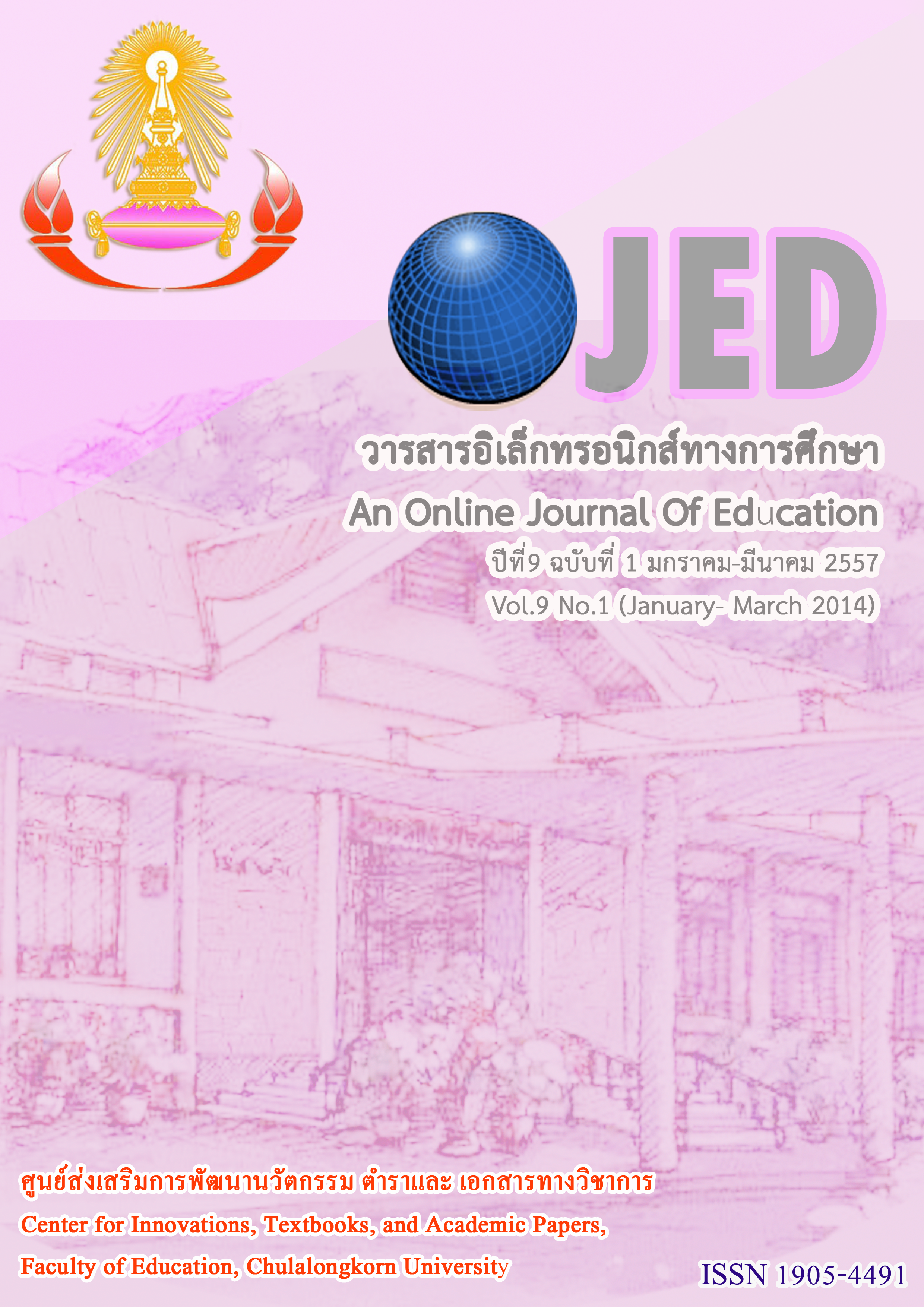การจัดการเรียนรู้ด้วยหลักไตรสิกขาเพื่อพัฒนาผลสัมฤทธิ์ทางการเรียน เรื่อง เพศศึกษาของนักเรียนมัธยมศึกษาตอนต้น*
Keywords:
การสอนสุขศึกษา, หลักไตรสิกขา, HEALTH EDUCATION, TRISIKKHA PRINCIPLES (THE THREE-FOLD EDUCATIONAL PRINCIPLES)Abstract
การวิจัยครั้งนี้เป็นการวิจัยกึ่งทดลอง มีวัตถุประสงค์ 1)เพื่อศึกษาผลของการจัดการเรียนการสอนด้วยหลักไตรสิกขาที่มีต่อผลสัมฤทธิ์ทางการเรียนเรื่องเพศศึกษาของนักเรียนชั้นมัธยมศึกษาปีที่ 2 2)เพื่อเปรียบเทียบผลสัมฤทธิ์ทางการเรียนเรื่องเพศศึกษาของนักเรียนชั้นมัธยมศึกษาปีที่ 2 ระหว่างกลุ่มที่เรียนโดยการจัดการเรียนการสอนด้วยหลักไตรสิกขากับกลุ่มที่เรียนโดยการจัดการเรียนการสอนด้วยวิธีปกติ 3)เพื่อศึกษาความคิดเห็นของนักเรียนชั้นมัธยมศึกษาปีที่ 2 ที่มีต่อการจัดการเรียนการสอนด้วยหลักไตรสิกขา กลุ่มตัวอย่างคือ นักเรียนชั้นมัธยมศึกษาปีที่ 2 ภาคเรียนที่ 2 ปีการศึกษา 2556 โรงเรียนสันติราษฎร์วิทยาลัย จังหวัดกรุงเทพมหานคร แบ่งเป็นกลุ่มทดลองที่เรียนหลักไตรสิกขา จานวน 30 คน และกลุ่มควบคุม ที่เรียนด้วยวิธีปกติ จานวน 30 คน สาหรับเครื่องมือที่ใช้ในงานวิจัย ได้แก่ แผนการจัดการเรียนรู้ด้วยหลักไตรสิกขาเรื่องเพศศึกษา จานวน 8 แผน แบบทดสอบด้านความรู้เรื่องเพศศึกษา แบบทดสอบถามด้านเจตคติเรื่องเพศศึกษา แบบสอบถามด้านการปฏิบัติเรื่องเพศศึกษา และแบบสอบถามความคิดเห็นต่อการจัดการเรียนการสอนด้วยหลักไตรสิกขา ซึ่งผู้วิจัยเป็นผู้ดาเนินการสอนกลุ่มทดลองด้วยตนเอง ส่วนกลุ่มควบคุมให้ครูประจาวิชาเป็นผู้สอนตามปกติ มีการวัดผลสัมฤทธิ์ทางการเรียนของนักเรียน ทั้งสองกลุ่มก่อนและหลังการทดลอง จากนั้นนาข้อมูลที่ได้มาวิเคราะห์หาค่าเฉลี่ย ส่วนเบี่ยงเบนมาตรฐาน และทดสอบความแตกต่างด้วยค่าที(t-test)
ผลการวิจัยพบว่า 1) คะแนนเฉลี่ยด้านความรู้ ด้านเจตคติ ด้านการปฏิบัติ ก่อนและหลังการเรียนด้วยหลักไตรสิกขามีความแตกต่างกันอย่างมีนัยสาคัญทางสถิติที่ระดับ.05 2) คะแนนเฉลี่ยด้านความรู้ ด้านเจตคติ ด้านการปฏิบัติ ของการเรียนด้วยหลักไตรสิกขาและการเรียนแบบปกติมีความแตกต่างกันอย่างมีนัยสาคัญทางสถิติที่ระดับ.05 3) คะแนนความคิดเห็นต่อการจัดการเรียนการสอนด้วยหลักไตรสิกขาโดยรวมอยู่ในระดับดีมาก
This study was a quasi – experiment research. The purposes of the research were to study the effects of the instruction using Trisikkha principles (The Three-fold educational principles) on the academic achievement in sex education teaching of eighth grade students, to compare the academic achievement in sex education teaching between Trisikkha principles method and the conventional method and to study the students’ opinions concerning Trisikkha principles teaching method in sex education. The sample group was the eighth grade students of Santirat Wittayalai school, during the secound semester of academic years 2013. The 30 students, experimental group, were assigned to study under Trisikkha principles teaching method which was taught by the researcher while the other 30 students, control group, were assigned to study with the conventional teaching method by health education teacher in that school. The research instruments were composed of eight learning activity plans using Trisikkha principles teaching method. The knowledge test, the attitude test, the practices test and the questionnaires concerning the students’ opinions on Trisikkha principles method were applied. The obtained data were then analyzed in terms of percentages, means, standard deviations and the t-test was also applied.
The research findings were as follows: 1) The mean scores of the experimental group were found higher significantly than before learning by using Trisikkha principles at the .05 level 2) The mean scores of the experimental group were found higher significantly than the control group after learning by using Trisikkha principles at the .05 level. 3) The students’ opinions concerning the instruction using Trisikkha principles in sex education teaching were found at the very good level.




